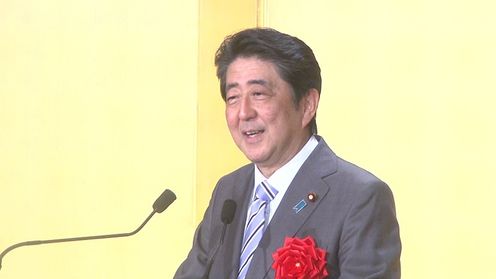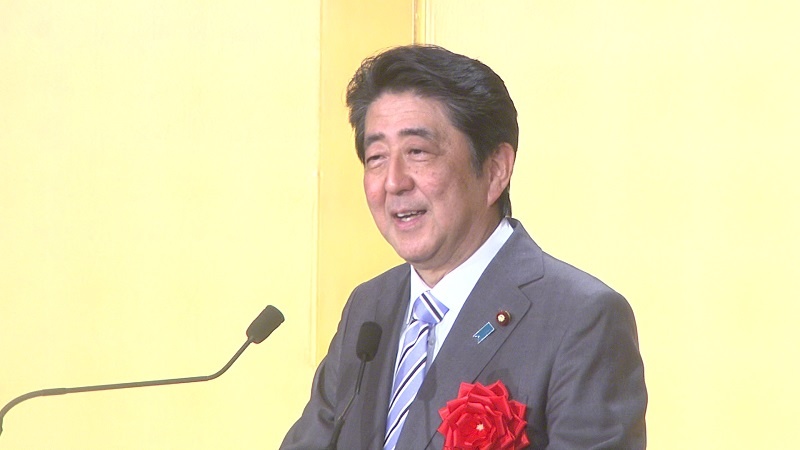Home > News > The Prime Minister in Action > January 2019 > Jiji Press New Year Party
The Prime Minister in Action
Jiji Press New Year Party
January 7, 2019
[Provisional Translation]
On January 7, 2019, Prime Minister Shinzo Abe attended the Jiji Press New Year Party held in Tokyo.
The Prime Minister said in his address,
“I extend my congratulations for the successful holding of the Jiji Press New Year Party in such a magnificent manner once again this year with the attendance of many people.
I just shook hands with President Omuro as if we were taking a poster photo for the election campaigns. If President Omuro wishes to, I hope he will run for a proportional representation seat.
This year is the final year of the Heisei period and the dawn of a new era. We have been enjoying all in all quite nice weather up until today and it has been a pleasant New Year. As I visited Ise Jingu on January 4 and saw Mt. Fuji distinctly out the window of the Shinkansen, I had a good inkling about the coming year in the beginning of this New Year. Afterwards, I returned to my hometown and attended a New Year party there. On my way to the party venue, I saw an arc of a rainbow distinctly. Furthermore, while I was looking at the rainbow, two deer strutted across, as if they were envoys of the Shinto deity. When I was telling someone in my hometown about how great it was to see deer that day, he said, ‘Mr. Abe, the deer have been a nuisance for us.’ While being asked to get rid of them as “harmful animals,” I thought it should have been a precious opportunity to see them. Anyway, I hope that it will be a great year. At Ise Jingu, I prayed for peace in Japan and the Imperial Family to flourish in this historic year, which will see the succession to the Imperial throne and Japan’s first hosting of the G20 Summit (Summit on Financial Markets and the World Economy).
This year is the Year of the Boar. The year is said to be a tough one to hold an election. This is because the nationwide local elections and the House of Councillors elections are held. While I touched upon this year would be a good year just before, the press coverage is already all about the elections. The year of the boar 12 years ago regrettably saw a disappointing outcome for the Abe administration. To begin with, I feel I was also young at the time. I read my New Year’s address at that time, which stated that like a boar, I would unfalteringly lead the way ahead toward the creation of a beautiful country. I sound so youthful. It turns out after careful examination that a boar is not such a simple animal. There is an expression in Japanese meaning “to dash ahead without hesitation like a boar (chototu-moshin).” Boars can reach 50 kph when they break into a run, but if obstacles are in their way, they will skillfully avoid them; they also carry themselves with such resilience. If it appears that they will face difficult places, they will make a U-turn and advance from a different path. The difference between now and 12 years ago is that I have acquired this knowledge. This year, I will manage the administration with humbleness, all the while having a flexible and tolerant mindset. I see from the change in Chief Representative Yamaguchi’s facial expression that my last comment has brought him relief somewhat.
Over the past six years, I have worked on economic issues as the highest priority. I am pleased to say that the current recovery of the Japanese economy has exceeded ‘Izanagi boom’ to match the longest period of postwar economic recovery and is said to exceed it. The previous longest period of postwar economic recovery began during the Koizumi administration, continued through the Abe administration and the Fukuda administration, and lasted until the Aso administration. Including my time, that economic recovery did last a long time. Indeed, I have taken into account the lessons in advancing an economic policy comprised of a set of three arrows. Between the previous and current recoveries, there are several differences. First, as we have created a non-deflationary condition this time, nominal GDP has grown by five times in the six years of the previous recovery. It has grown by 10.9%. This is a fivefold growth from the previous recovery when it was just over 2%. In addition, jobs have been created. During the previous recovery, I believe jobs were created for one million people. This time, over three million jobs have been created. The biggest difference is that the previous economic recovery was extremely skewed. According to the Short-Term Economic Survey of Enterprises in Japan (Tankan) of the Bank of Japan (BoJ), it was only in the Kanto and Tokai regions where business sentiment was positive throughout the entire previous economic recovery period. For example, in Hokkaido and Shikoku, business sentiment was negative throughout this period. Meanwhile, in the case of the current economic recovery, business sentiment has been positive in all regions over the last five years. I believe this is the reason that the ratio of active job openings to applicants has exceeded 1.0 for all 47 prefectures. This year, I would like to strengthen this economic growth much further, rather than maintain it as well as increase productivity and steadily promote innovations.
Furthermore, the Trans-Pacific Partnership (TPP) 11 (Comprehensive and Progressive Agreement for Trans-Pacific Partnership) has entered into force, and the Economic Partnership Agreement (EPA) between Japan and the European Union (EU) will also enter into force this year. I can see Ambassador Cheng Yonghua—Japan also hopes to work with China to reach an agreement on the Regional Comprehensive Economic Partnership (RCEP). Japan will fulfill the role of a standard bearer for free trade, and in this sense, from the viewpoint of the G20 Presidency, I believe this year’s G20 Summit will be extremely critical.
Under such circumstances, speaking on elections, we are often seeing speculation among the press that a ‘double election*’ may be called. I would like to stress that this is not even in the back of my head. I have consistently made the same comment over the last six years. Then, some note that I have actually called general elections twice despite my comments over the six years that elections are not even in the back of my mind. Let me state that, this time, a double election is nowhere in my mind. A year after since the previous party, I still believe that we want to secure victory in the House of Councillors election by confidently carrying out solid policy debates.
In this year’s Diet session, we will submit a series of bills to materialize tuition-free childhood education as well as a series of bills to introduce tuition-free higher education next year. I intend to make this year a cornerstone for advancing a series of reforms, transition to a social security system oriented to all generations.
The Year of the Boar 60 years ago was exactly the time of the Kishi administration. At that time, the negotiations to revise the Japan-U.S. Security Treaty were at their climax. Furthermore, 60 years ago was the year that laid the foundation of the social security system by passing the Minimum Wage Act and the National Pension Act. In this regard, I hope to establish a solid foundation during the year of this zodiac. I would like to close my remarks by wishing everyone a brilliant year to come. Thank you very much.”
* Joint election of the House of Representatives and the House of Councillors


